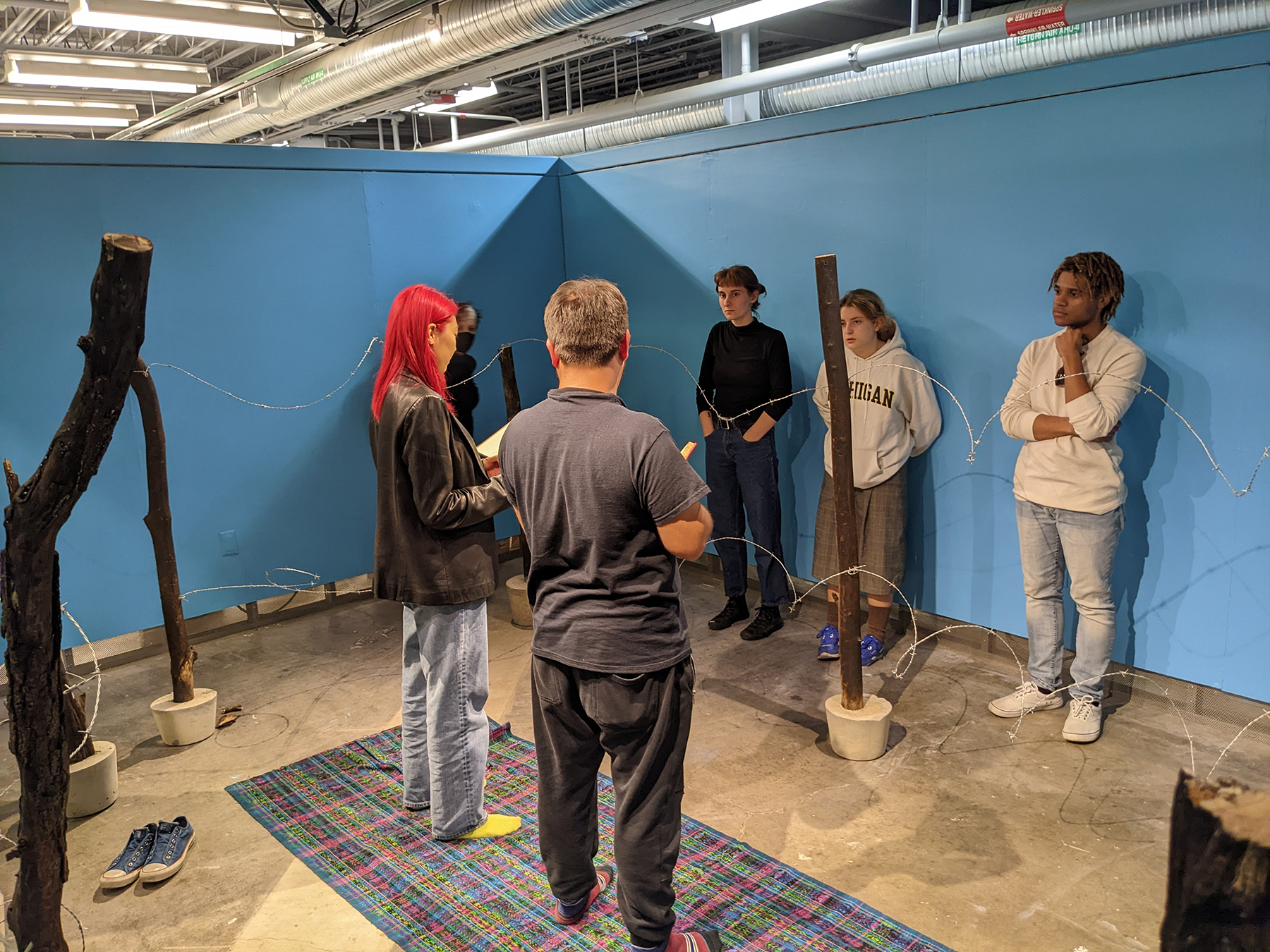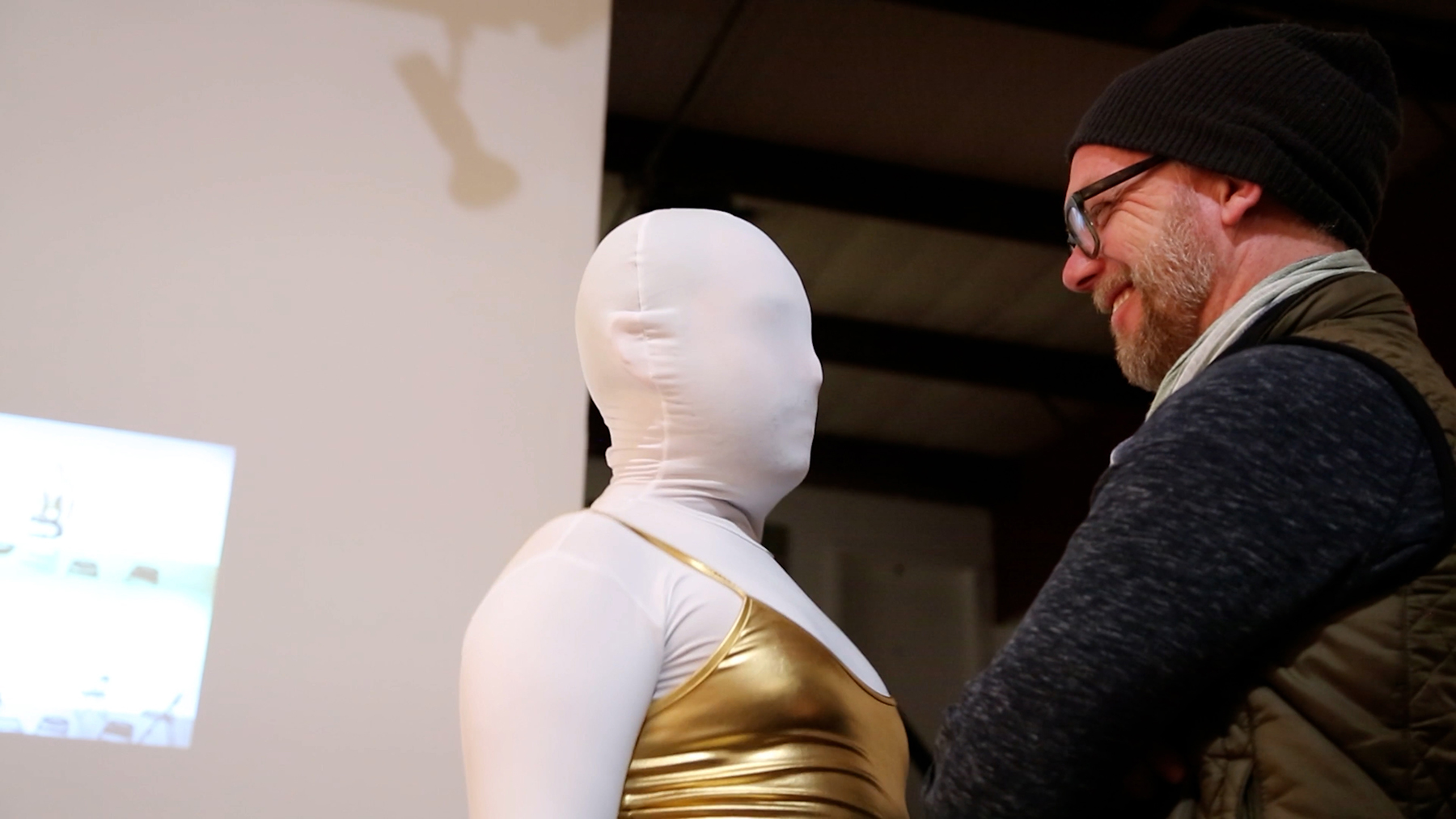Decisions, Decisions: In the run-up to the 2022 midterm elections, this article is part of a limited series looking at the concept of decision making from the perspectives of Rackham’s four main divisions: the biomedical sciences, the physical sciences and engineering, the social sciences, and the humanities and the arts.
Before passing through a set of gauzy curtains and entering into a room covered top to bottom in soft pink fur, artist Emerson Granillo will ask if you’d like to remove your shoes. Pink over-the-shoe booties are supplied if you’re more comfortable with footwear. Once inside, you’ll likely run your hand over the plush walls, the plush chairs–maybe you’ll make patterns in the fur, brushing it this way and that. After a time, Granillo will ask if you’d like company. Gently, they’ll ask you how your day is, how you’re feeling. They’ll invite you to think of a small gesture that made a positive impact on your day; they’ll invite you to hold that gesture in your mind, cradled by the plush space, before it’s time for you to go.

Often, visitors to will start to mirror Granillo’s motions on the fur in “A Simple Gesture,” creating an organic synchronicity.
A Simple Gesture is Granillo’s installation exploring ways that we find connection through small everyday acts of kindness. Granillo is a second year M.F.A. student at the Penny W. Stamps School of Art & Design and the work was first staged last spring as part of the MFA First Year exhibition at the Faculty and Graduate Studio.
“To me, the pink fur represents my queerness and an invitation to spend time in this queer space and to find comfort there,” Granillo says. “I’m providing space for people to feel comfortable being curious, which I think is a really important step in dealing with shame.”
Much of Granillo’s current installation and performance art commits to an exploration of shame. They are interested in cultivating the curiosity and openness needed to acknowledge shame, share it with others, and learn how to heal and live with it.
A Simple Gesture is the second part of a diptych, arriving at a place of comfort after a complex journey through sexual shame. The first installation of the diptych, Adoorable, a series of closed doors and small windows lit by provocative videos of people’s mouths. A soundscape of hard-heeled men’s dress shoes walking the hallway permeates the space, a nod to authority on patrol, amplifying an “about-to-get-caught” feeling.

While doors start out closed in “Adoorable,” Granillo hopes visitors will enter each door, drawn in by the light of the videos.
“Instead of shunning shame, or pretending that it’s not there, I’m having conversations with shame and seeing what comes out of that,” Granillo says. “I can only share my experiences with shame in hopes that it will lead someone to understand their own shame, whatever that means to them and whatever that looks like for them.”
A Work in Progress

A group of five individuals standing around Granillo’s work in progress “¿Puedes enseñarle, no tengo paciencia?/Can you teach him, I don’t have the patience” (working title) at the Stamps School of Art & Design’s Faculty and Graduate Studio.
¿Puedes enseñarle, no tengo paciencia?/Can you teach him, I don’t have the patience (working title), an installation in progress, explores the concept of shame around national identity and immigration; Granillo immigrated from Guatemala to the U.S. when they were five and has only been able to visit a small handful of times.
“At the time when I came to the U.S., there was kind of a lot of shame around being an immigrant,” they say. “Even though my parents didn’t speak English, there was really never access to my culture. I speak Spanish, but I didn’t really know what it meant to be Guatemalan.”
Metaphors for the pains of moving between cultures are alive in Puedes enseñarle. The installation features two parallel lines of barbed wire strung loosely between charred wooden poles to form a rectangle, a fencing style common in Guatemala. There is a lot of loose space between wires, a permeable boundary that guests are encouraged to go through to experience the work from the inside.
When a guest climbs between the wires, it’s easy to snag a bit of clothing and leave a bit of oneself behind. Traversing the wires must be done with caution and the slightest nudge has a reverberatory effect, sending the wires dancing and casting new shadows on the wall. The charred wood too leaves behind a highly transferable residue, leaving behind a history of everything touched in feathery black smudges.
“My whole experience has been that I’m neither from there nor from here. I’m not white enough to be American, but then I’m also not brown enough to be Guatemalan,” they say. “Puedes enseñarle celebrates access to my culture, but also grieves my culture.”
A Process of Listening

Emerson Granillo is a second-year M.F.A. student at the Penny W. Stamps School of Art & Design at U-M.
This summer, Granillo spent two months in Guatemala on a research trip to learn more about their family and Guatemalan culture.
Instead of conducting traditional interviews with family members, Granillo found a different way to get them to open up: cooking together. Granillo would ask their relatives to show them how to cook family favorites, immediately positioning the relatives as experts and creating a sense of comfort with the process.
“I used the simple gesture of cooking to create entry points to conversation,” Granillo says. “I’m trying to provide a process to be curious and to explore and how to navigate families and how to navigate storytellers.”
Granillo first learned the importance of setting the stage for gentle dialogue when they served as an associate board member at Sarah’s Inn, a Chicago-based agency that provides services for families affected by domestic violence. They continue to use this skill in their work with the AIDS Action Committee, providing emergency assistance to people who are HIV-positive.
“I learned that it’s important not to just go into a sensitive environment and start asking questions. Small gestures can lead to conversation–and when they do, active listening is so important to maintaining that openness,” Granillo says.
They stress that with active listening, the person receiving the story should never try to impose anything. It’s an exercise in hearing what the speaker has said and reflecting or reframing those words back to them.
“Before I could listen well to others, I had to learn how to listen to myself,” Granillo says. “I needed to let go of needing to prove myself all the time to just be present.”
As a performance artist, being present is a critical skill–as is making and committing to decisions.
Deciding to Commit

Emerson Granillo performs “Gold Rush,” a four-hour participatory piece that only ends when the audience member walks away to disengage.
In a four-hour durational performance entitled Gold Rush, Granillo wears a full white spandex bodysuit–covering them head to toe–and a gold mini-dress. They engage with gallery visitors by selecting one to walk up to and dance in front of, seductively and silently.
“The body is so powerful, specifically a non-gendered body,” Granillo says. “Gold Rush asks the questions: Am I smart enough? Am I white enough? And physically taking on that persona of putting a white body on me and confronting the question.”
Committing to their interactions with gallery visitors was an integral part of the piece, especially as the work relies on the visitor coming to their own realization that they have the final say on when the interaction is over.
“There was only one moment where I really had to decide whether I was going to stay with my creative choice or whether I was going to break my own rules because of this one person who got really aggressive–they were really getting in my face. Then I was just like, ‘No. This is a decision and I have to stick with the decision that I made,’” Granillo says.
Committing to decisions where the outcomes are ambiguous–and even dangerous–can be a terrifying proposition. For Granillo, the best way to move forward is to develop and maintain a strong sense of community.
“Having your community being able to support you and encourage you into and through the unknown has helped me out tremendously throughout my entire life,” they say. “My connection to my community has allowed me to grow and really be present in my decisions.”
Explore Emerson Granillo’s Work
See still images and videos of each performance.
Emerson Granillo’s Web Portfolio
How Rackham Helps
Granillo is the recipient of the Rackham Merit Fellowship, which they say has provided them with the opportunity to focus on their studies without external distractions, and the Rackham International Research Award, which funded their summer 2022 research trip to Guatemala.
In addition to their M.F.A. studies at the Stamps School of Art & Design,
Granillo also participates in Rackham professional development workshops, including the 2021 offering, Healing Identity-Based Trauma. “This workshop helped me define microaggression and explore the emotional impact of identity-based microaggressions,” they say. “I was able to explore and apply a four-step healing process for addressing identity-based trauma.”
Granillo is also part of the Rackham Professional Development Diversity, Equity, and Inclusion Certificate Program (DEICP), which they say has been instrumental to their professional goals of professorship.
“Receiving the DEI Certificate will help me to provide communities and students with the permission to share their own voices, which will allow them to become the future leaders of tomorrow,” Granillo says.

